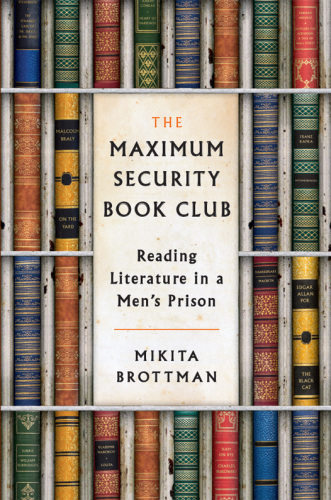
The Maximum Security Book Club
Reading Literature in a Men's Prison
کتاب های مرتبط
- اطلاعات
- نقد و بررسی
- دیدگاه کاربران
نقد و بررسی

March 7, 2016
For the past three years, Brottman (The Great Grisby), a professor at the Maryland Institute College of Art, has maintained a book club in which the nine other participants are inmates at Maryland’s Jessup Correctional Institution. In this introspective piece, she recounts a two-year period during which her group (which necessarily has fluctuating membership) covered 10 books, including Heart of Darkness, Lolita, and Macbeth. A self-described “quiet, private, law-abiding type with no criminal record,” she assures readers that “I can’t help but feel a powerful allegiance to those whose lives haven’t worked out so well.” Unfortunately, her position comes across as one of naïveté and privilege; she challenges the men with books she finds dark and fascinating, and is surprised when they are bored or confused. She makes assumptions about prison inmates, only to have her expectations upended time and again. By the end, she confronts reality: “I was not turning them into readers. They were just men who attended the prison book club.” While Brottman has delivered an interesting look at the intersection of prison life and literature, her inability to perceive the flaws in her own perspective weakens the result. Agent: Betsy Lerner, Dunow, Carlson & Lerner Literary Agency.

January 1, 2016
Ranging from William Shakespeare's Macbeth to William Burroughs's Junkie, the ten morally arresting classics on the syllabus devised by literary scholar Brottman would fire the mind of any intellectually inclined undergraduate. But she read them with members of a book club she started with convicts at the Jessup Correctional Institute, a maximum security prison in Maryland.
Copyright 2016 Library Journal, LLC Used with permission.

May 1, 2016
Compassionate account of running a literary reading group among convicts at Maryland's Jessup maximum security prison.Psychoanalyst and author Brottman (Humanistic Studies/Maryland Institute Coll. of Art; The Great Grisby: Two Thousand Years of Literary, Royal, Philosophical, and Artistic Dog Lovers and Their Exceptional Animals, 2014, etc.) hypothesizes that her own hardscrabble British childhood left her able to relate to criminal outcasts. "I've long been preoccupied with the lives of people generally considered unworthy of sympathy," she writes. Beginning as a volunteer during her sabbatical, she's kept the reading group going for over three years, despite her concerns that "the compulsion that draws me to these men is less an allegiance than...a form of survivor's guilt." Brottman argues that even dark literary works can salve the desperation of a long prison sentence, and she captures the camaraderie created within the group. Each chapter focuses on the group's reactions to a particular work, while she develops the inmates' personal stories in the context of prison's rigors. Her perspective on her subjects becomes disarming, although several have committed murder and others struggle with mental illness. Brottman's literary selections tend to be bleak and difficult: she began with Heart of Darkness and "Bartleby, the Scrivener" and then moved on to transgressive work by Charles Bukowski and William Burroughs. "To them," she writes, "as to [Bukowski stand-in] Henry Chinaski, brutality was a fact of nature." The book group remains a sought-after activity. The author claims that almost "no one dropped out unless they were released or transferred," even as funding for such programs has diminished. Brottman's own literary discussion is thoughtful, but the main appeal is the developing bond with her allegedly unsalvageable students, whose warmth and perceptiveness constantly surprise her. As one observes regarding Poe's "The Black Cat," "they bury us alive without thinking twice about it." Will not appeal to hard-core law-and-order types, but others will find this a brave and empathetic story of how literature brings light into shadows.
COPYRIGHT(2016) Kirkus Reviews, ALL RIGHTS RESERVED.

























دیدگاه کاربران